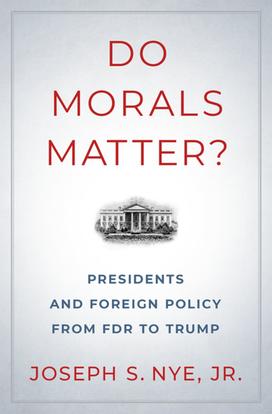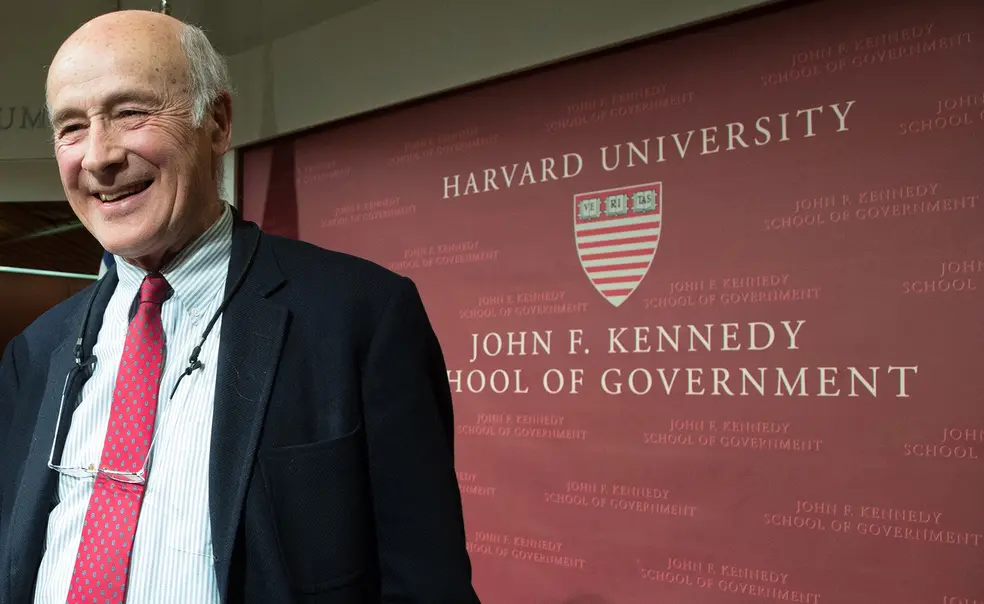Joseph S. Nye Jr. ’58 Scores Presidential Morality in American Foreign Policy

The book: When it comes to foreign policy decisions, do ethics play a role? Joseph S. Nye Jr. ’58 probes this question in an analysis of ethical decisions in American foreign policy. Some presidents are lauded for their moral clarity while others make decisions with good intentions that prove to be ethical failures.
In Do Morals Matter? Presidents and Foreign Policy from FDR to Trump (Oxford University Press), Nye proposes that we can judge morality on three ethical dimensions involved in the decision-making process. From Truman to Trump, Nye evaluates each president using this rubric and assesses their leadership qualities, means to achieve ends, and the outcomes of their decisions to suggest that each one had legitimate choices and that “the system” is not solely to blame.
The author: Joseph S. Nye Jr. ’58 is University Distinguished Service Professor Emeritus and former Dean of Harvard’s Kennedy School of Government. After earning his bachelor’s degree from Princeton, Nye won a Rhodes Scholarship to Oxford, and earned a Ph.D. in political science from Harvard. He has served as Assistant Secretary of Defense for International Security Affairs, Chair of the National Intelligence Council, and a Deputy Under Secretary of State. He is a fellow of the American Academy of Arts and Sciences, the British Academy, and the American Academy of Diplomacy. In a recent survey of international relations scholars, he was ranked as the most influential scholar of American foreign policy, and in 2011, Foreign Policy named him one of the top 100 Global Thinkers.
Opening Lines: In his 2017 inaugural address, Donald J. Trump proclaimed that “from this day forward, it’s going to be America first. America first ... We will seek friendship and good will with the nations of the world, but we do so with the understanding that it is the right of all nations to put their own interests first.” That seems obvious. Leaders are trustees. We vote for them to protect our interests. But how should they define and represent our interests? How moral do we want our presidents to be in foreign policy? And what would that mean? Do we have duties beyond borders? Can we — indeed, should we — try to make the world a better place?
American Exceptionalism
Americans have long seen our country as morally exceptional. As Theodore Roosevelt put it a century ago, “Our chief usefulness to humanity rests on combining power with high purpose.” Based as much on ideas as ethnicity, America has long seen itself as a cause as well as a country. Belief that one’s country is exceptional is a common form of nationalist pride. For some Americans, exceptionalism represents chauvinist pride and moral superiority, but for others it simply means patriotism based on shared civic ideals combined with cooperative internationalism. Barack Obama expressed this modest moralism in 2009 when he said, “I believe in American Exceptionalism, just as I suspect that the Brits believe in British exceptionalism and the Greeks believe in Greek exceptionalism” But some Americans criticized Obama for the modesty of his claim.
Stanley Hoffmann, a Harvard political scientist who was both French and American, once pointed out that every country likes to think of itself as unique, but France and the United States stand out in their beliefs that their values are universal. France, however, was limited in its ambitions by the balance of power in Europe and thus could not indulge its pursuit of universal values as much as it wished. In Hoffmann’s words, Only the United States tried to develop foreign policies that reflect such exceptionalism and also had the leeway of power to do it.
Reviews: “With characteristic insight and precision, Joseph Nye raises tough questions of how much ethics should shape a nation’s foreign policy, provides a sweeping review of how past presidents have embraced or rejected ethical imperatives, and constructs a helpful scorecard for judging future presidents. This book takes on even greater significance as a growing number of nations—led by the U.S.—nakedly put self-interest first.” — David Gergen, CNN Senior Political Analyst, and Founding Director, Harvard Kennedy School Center for Public Leadership












1 Response
Norman Ravitch *62
5 Years AgoAmerican Exceptionalism
Hardly could I fail to notice in this review of Professor Nye’s book the view of Stanley Hoffmann that France and America had good reasons for believing their national experience to be exceptional. But I must differ. Yes, both had revolutions in the late 18th century which gave weight to such beliefs. However it took the French only a few years to transform their exceptionalism into ordinary territorial greed and in the years leading to WWII into racist chauvinism. It took the United States about the same amount of time to transform its exceptionalism into imperialism and international hypocrisy as well. Neither country can rest on its laurels.